xx非全日制硕士研究生考试英语1.-精心整理
非全日制研究生和在职研究生有什么区别?

非全日制研究生和在职研究生有什么区别?区别有太平洋那么大。
在职研究生允许职场人在工作之余参加学习,一般有同等学力申硕、非全日制、高级研修班和中外合作办学 4 种求学方式。
不同的求学方式有挺大区别,展开来说就是:一、获得的证书不同这是很多人关心的问题,所以先来讲。
1.同等学历申硕的学生,将在毕业时获得结业证和学位证单证。
这意味着你的学历仍然是原本的学历,而不是硕士学历(这也解释了为什么有些领导在个人简历中的文化程度一栏写着「本科学历,经济学硕士」)。
2.非全日制硕士研究生会在毕业时,拿到双证(毕业证和学位证)。
举个栗子,如果你读的是非全 MBA,那么,毕业后,就可以在简历上注明「研究生学历,工商管理硕士」。
3.在规定时间里完成学习任务、通过院校考试的高级研修班学生,就能获得课程结业证,但结业证不会改变学生原有学历。
二、考试形式和内容不同1.同等学力申硕考试是一种合格性考试,它允许考生在四年内分别通过两个项目。
例如,第一年可以通过英语考试,第二年或第三年再考专业课,只要在四年内通过两科,就可以申请硕士学位证书。
同等学力申硕只考外语和专业课两门。
外语科目可以自行选择英语、法语、俄语或德语,其中英语难度相当于公共英语 3 到 4 级水平。
2.非全日制考试是选拔性的。
考生要一次性通过初试和复试。
不过,像 MBA、MPA、MEM 等管理类专硕,由于其培养未来的企业家、管理者和某一领域的精英,更注重考生的实践能力而非笔试成绩。
因此,大部分院校会在初试之前进行复试(也称为提前面试)。
如果考生通过了面试,就会获得低分录取承诺。
在初试之前,考生可以参加无数个学校的提前面试,然后在考研报名时选择通过的学校进行报名。
4.中外合办的学生,毕业后仍是原学历,一般国外院校会颁发硕士学位证书。
二、考试形式和内容不同1.同等学力申硕考试是一种合格性考试,它允许考生在四年内分别通过两个项目。
例如,第一年可以通过英语考试,第二年或第三年再考专业课,只要在四年内通过两科,就可以申请硕士学位证书。
非全日制临床医学硕士条件要求
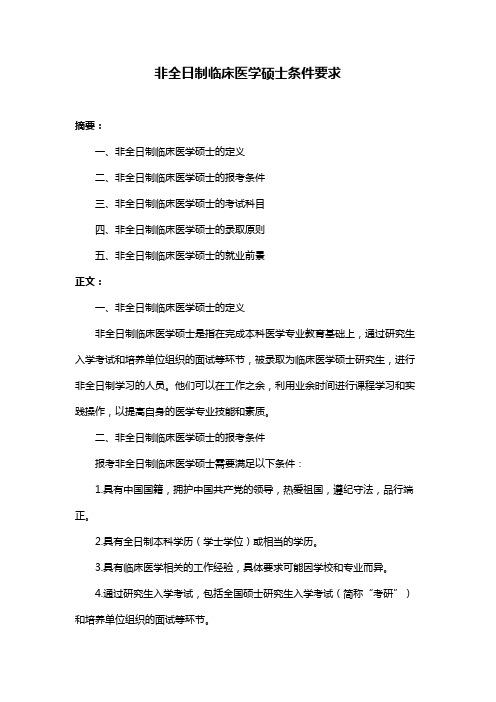
非全日制临床医学硕士条件要求摘要:一、非全日制临床医学硕士的定义二、非全日制临床医学硕士的报考条件三、非全日制临床医学硕士的考试科目四、非全日制临床医学硕士的录取原则五、非全日制临床医学硕士的就业前景正文:一、非全日制临床医学硕士的定义非全日制临床医学硕士是指在完成本科医学专业教育基础上,通过研究生入学考试和培养单位组织的面试等环节,被录取为临床医学硕士研究生,进行非全日制学习的人员。
他们可以在工作之余,利用业余时间进行课程学习和实践操作,以提高自身的医学专业技能和素质。
二、非全日制临床医学硕士的报考条件报考非全日制临床医学硕士需要满足以下条件:1.具有中国国籍,拥护中国共产党的领导,热爱祖国,遵纪守法,品行端正。
2.具有全日制本科学历(学士学位)或相当的学历。
3.具有临床医学相关的工作经验,具体要求可能因学校和专业而异。
4.通过研究生入学考试,包括全国硕士研究生入学考试(简称“考研”)和培养单位组织的面试等环节。
三、非全日制临床医学硕士的考试科目非全日制临床医学硕士的考试科目主要包括:1.全国硕士研究生入学考试:包括公共课(政治、英语)和专业课(临床医学综合)。
2.培养单位组织的面试:主要测试考生的综合素质、专业知识和实践能力等。
四、非全日制临床医学硕士的录取原则非全日制临床医学硕士的录取原则如下:1.坚持“德智体美全面发展”的原则,注重考生的综合素质和实践能力。
2.根据考生的考试成绩(包括全国硕士研究生入学考试和面试成绩)和临床医学相关的工作经验,择优录取。
3.培养单位根据招生计划和实际录取情况,确定录取名单。
五、非全日制临床医学硕士的就业前景非全日制临床医学硕士毕业后,可以在各级医疗机构、医学科研单位、医学院校等从事临床医疗、教学和科研工作。
随着社会对医疗卫生服务的需求不断增加,非全日制临床医学硕士毕业生在就业市场上有着广阔的前景。
非全日制研究生毕业生登记表自我鉴定

非全日制研究生毕业生登记表自我鉴定•相关推荐非全日制研究生毕业生登记表自我鉴定(精选17篇)自我鉴定就是把一个时间段的个人情况进行一次全面系统的总结,写自我鉴定有利于我们工作能力的提高,因此好好准备一份自我鉴定吧。
自我鉴定怎么写才是正确的呢?下面是小编精心整理的非全日制研究生毕业生登记表自我鉴定(精选17篇),欢迎阅读与收藏。
非全日制研究生毕业生登记表自我鉴定篇1回首三年的研究生校园生活和社会实践生活,有渴望、有追求、有成功也有失败,我孜孜不倦,不断地挑战自我,充实自己,为实现人生的价值打下坚实的基础。
现对自我鉴定如下:一、学习上从研一开始,我就一直认真学习,成绩一直名列前茅,每年都获得奖学金。
对知识的渴望,促使我不断学习新的知识,以巩固我的专业素养,为把自己培养成为一个合格的土木人而奋斗。
在研究生期间,我始终以提高自身的综合素质为目标,以自我的全面发展为努力方向,树立正确的人生观、价值观和世界观。
为适应社会发展的需求,我认真学习各种专业知识,发挥自己的特长;挖掘自身的潜力,结合每年的暑期社会实践机会,从而逐步提高了自己的学习能力和分析处理问题的能力以及一定的协调组织和管理能力。
由于所学的是土木工程专业,因此非常注重实际操作能力,除了理论学习之外,我的实践能力也得到非常大的提高。
课程安排上有力学试验、土木工程材料实验、土木工程测量实验等等,都是需要较高的操作水平。
在平时的学习中,我学的也比较快,做课程设计的时候也能达到优秀的标准。
同时我们专业对xxx等专业软件要求也很高,通过课堂上的学习以及课后反复练习,我都能熟练操作。
这对将来的学习和工作都十分重要。
二、思想上令我最自豪的事情是经过不断的努力学习和提高自己,我顺利的加入了中国共产党,并且成为一名光荣的党员。
感觉就像在自己的生命上添上了神圣的一笔,转化成为一种无形的力量在鼓励我,在督促我,在时时刻刻的检查我,让我在思想行为方面能够作风优良、待人诚恳,能较好处理人际关际,处事冷静稳健,能合理地统筹安排生活中的事务。
非全日制专家推荐信范文

非全日制研究生专家推荐信[收信人]尊敬的招生委员会:您好!我谨以此信向您强烈推荐我指导的硕士研究生张三,他即将参加贵校非全日制研究生的选拔。
张三在我担任其导师期间,表现出了卓越的学术潜力和强烈的求知欲望,我相信他将成为贵校研究生教育的一名优秀成员。
[推荐人信息]推荐人:李华职务:XX大学XX学院教授联系方式:电话:XXX-XXXX-XXXX,邮箱:*************.cn[被推荐人信息]被推荐人:张三毕业院校:XX大学所学专业:XX专业[正文]一、学术背景与能力张三于201X年考入我国XX大学XX专业,经过四年的系统学习,他不仅在专业课程上取得了优异的成绩,还积极参与了多项科研项目。
在本科期间,他曾参与“XX 项目”的研究工作,负责数据收集与分析工作,表现出了严谨的科研态度和较强的数据分析能力。
此外,他还曾获得XX学术竞赛省级一等奖,充分体现了他在学术领域的潜力。
二、科研能力与成果在研究生阶段,张三继续深入研究XX领域,取得了以下成果:1. 发表学术论文2篇,其中1篇为SCI检索论文;2. 参与编写教材1部,负责编写章节内容;3. 担任导师科研项目核心成员,负责部分实验设计与数据分析。
三、个人品质与团队协作张三具备以下优秀品质:1. 认真负责:对待学业和科研工作一丝不苟,能够按时完成各项任务;2. 团队协作:善于与团队成员沟通交流,共同解决问题,具备良好的团队精神;3. 谦逊好学:对待知识和技能的学习态度严谨,不断提升自身综合素质。
四、对贵校的建议鉴于张三在学术、科研和个人品质方面的突出表现,我建议贵校在选拔过程中给予他优先考虑。
我相信,在贵校的培养下,张三能够充分发挥自己的潜力,为我国XX领域的发展做出贡献。
[结语]综上所述,我衷心推荐张三参加贵校非全日制研究生的选拔。
如有需要,请随时与我联系,我将竭诚提供更多相关信息。
感谢您在百忙之中阅读此信,期待张三能在贵校开启新的学术征程。
此致敬礼![推荐人签名]李华[日期]年[月]月[日]日。
考研的英语作文格式范文

考研的英语作文格式范文英文:As a postgraduate student, I have always been asked about the format of the English composition for the postgraduate entrance examination. In fact, the format of the English composition for the postgraduate entrance examination is not much different from that of other types of English compositions. It still follows the basic structure of an introduction, body paragraphs, and a conclusion.In the introduction, it is important to clearly state the topic of the composition and provide some background information. This helps to set the stage for the reader and gives them a clear understanding of what the composition will be about. For example, if the topic is about the impact of technology on education, the introduction should briefly discuss the development of technology and its influence on the education system.Moving on to the body paragraphs, it is essential to present the main points and supporting details of the topic. Each body paragraph should focus on one main point and provide evidence or examples to support it. It is also important to use transition words and phrases to ensure a smooth flow between paragraphs. For instance, when discussing the positive impact of technology on education,I would provide examples of how technology has improved access to information and enhanced interactive learning experiences.Finally, the conclusion should summarize the mainpoints discussed in the body paragraphs and restate the thesis statement. It is also a good idea to leave thereader with some food for thought or a call to action. For example, in the conclusion of the composition about technology and education, I would emphasize the need for educators to adapt to the changing landscape of technology and embrace innovative teaching methods.中文:作为一名研究生,我一直被问及研究生入学考试英语作文的格式。
硕士学位研究生入学资格考试

2012年
2012年工程硕士报名条件、报考时间和考试大纲 报考条件: 具备以下条件之一的在职工程技术或工程管理人员,或在学校从事工程技术与工程管理教学的教 师可以报考: 1、2009年7月31日前获得学士学位。 2、2008年7月31日前获得国民教育序列大学本科毕业证书。 报考电子与通信工程、控制工程、计算机技术等领域的考生可不受年限的限制,入学前未达到上 述年限要求而被录取为工程硕士生的,需在修完研究生课程并从事工程实践两年以上,结合工程 任务完成学位论文(设计),方可进行硕士学位论文(设计)答辩。
考前模拟实战训练非常重要,一定要控制在3小时内做完4科的模拟试题,从中把握考试的节奏, 因为每个考生这4科的基础不一样,通过模拟训练。
(4)同时特别要引起大家注意的是,千万不能忽略考场中的科目顺序安排,应该从实际出发, 结合自己的思考及心理特点安排好所答的科目顺利,而不至于上考场发懵。先做哪一科,后做哪 一科应该有个策略上的考虑。极其重要的一点是,只要把握好考试时间的分布,合理分配时间, 就能最大限度地发挥自己的真实水平,就一定能有机会拿高分。2009年工程硕士报名条件、报考 时间和考试大纲。
问题解答
1.无学士学位能否报考:无学位,是指没有学士学位,以大学本科学历报考GCT的同学,没拿到 学位原因无非是没过英语或者补考太多,也有因学习年限超过规定(自考一般要求4年毕业)丧 失申请资格等等。无学位的劣势反映在GCT考试中,是面临录取比例的限制。
录取限额:每年招收无学位的考生不超过10%的限额(其他专业硕士限额不同),即如果某校招 100名,那么其中无学位的同学只能招收10名。学校在录取时一般是把有学位和无学位分开从高 到低录取的。
1998年国务院学位委员会办公室组织实施在职人员攻读硕士专业学位工作,从2000年起,在职 人员攻读硕士专业学位由各招生院校联合组织考试发展为全国联考,统一考试、统一录取,有学 位、无学历,俗称单证研究生,也称非全日制研究生。2014年,国务院学位委员会印发《关于 2014年招收在职人员攻读硕士专业学位工作的通知》(学位办〔2014〕18号),通知指出,为统 一管理各类研究生招生工作,从2016年起,不再组织在职人员攻读硕士专业学位全国联考,除高 级管理人员工商管理硕士外,其他类别的在职人员攻读硕士专业学位招生工作,将以非全日制研 究生教育形式纳入国家招生计划和全国硕士研究生统一入学考试管理。
考研复试英语自我介绍范文非全

考研复试英语自我介绍范文非全English:Hello, my name is [Your Name]. I am very grateful for the opportunity to introduce myself to you. I recently graduated from [Your University] with a major in [Your Major]. During my undergraduate studies, I have developed a strong passion for [Your Field] and have actively participated in various research projects and academic activities. I believe that pursuing further education at your prestigious university will allow me to further cultivate my academic interests and contribute positively to the field. Apart from my academic pursuits, I have also been involved in various extracurricular activities, such as volunteering at local community organizations and taking on leadership roles in student clubs. These experiences have equipped me with strong communication, teamwork, and leadership skills, which I believe will be valuable for my future studies and career. I am confident that my background and experiences have prepared me well for the challenges of graduate studies, and I am eager for the opportunity to learn from the esteemed faculty and diverse student body at your university.中文翻译:大家好,我叫[你的名字]。
考研大作文英文模板
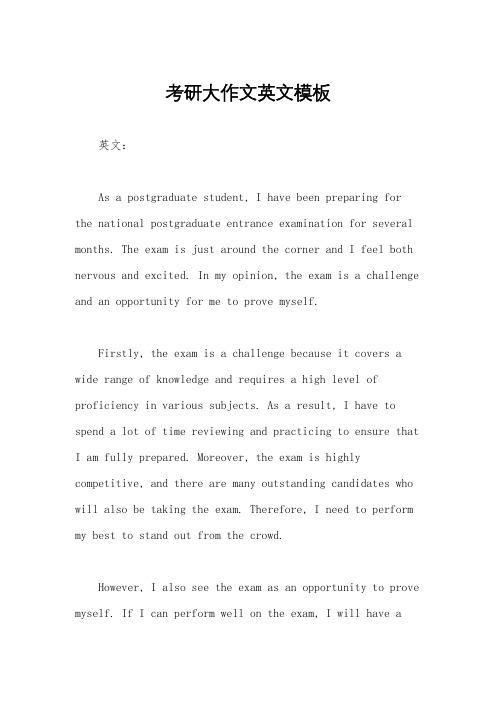
考研大作文英文模板英文:As a postgraduate student, I have been preparing for the national postgraduate entrance examination for several months. The exam is just around the corner and I feel both nervous and excited. In my opinion, the exam is a challenge and an opportunity for me to prove myself.Firstly, the exam is a challenge because it covers a wide range of knowledge and requires a high level of proficiency in various subjects. As a result, I have to spend a lot of time reviewing and practicing to ensure that I am fully prepared. Moreover, the exam is highly competitive, and there are many outstanding candidates who will also be taking the exam. Therefore, I need to perform my best to stand out from the crowd.However, I also see the exam as an opportunity to prove myself. If I can perform well on the exam, I will have abetter chance of being admitted to a top university and pursuing my dream of becoming a researcher. Additionally, the exam is a good chance for me to review what I have learned and consolidate my knowledge. Through the processof preparing for the exam, I have developed good studyhabits and improved my problem-solving skills.In conclusion, although the national postgraduate entrance examination is a challenge, I see it as an opportunity to prove myself and achieve my goals. I will continue to work hard and prepare for the exam, and Ibelieve that with my efforts and determination, I will be able to succeed.中文:作为一名研究生,我已经为全国研究生入学考试准备了几个月。
考研英语一小作文格式

考研英语一小作文格式The Importance of Setting Goals。
Setting goals is an important part of achieving success in life. Without a clear set of goals, it can be difficult to know where to focus your time and energy, and you may find yourself drifting aimlessly without making any progress towards your dreams. In this essay, I will discuss the importance of setting goals and provide some tips for how to set effective goals that will help you achieve your dreams.Firstly, setting goals helps you to clarify your priorities and focus your efforts on what really matters. When you have a clear set of goals in mind, you can more easily identify the actions and behaviors that will help you move closer to achieving them. This can help you to make better decisions about how to spend your time and energy, and avoid wasting your resources on activities that are not aligned with your goals.Secondly, setting goals provides motivation and direction. When you have a clear sense of what you want to achieve, it can be easier to stay motivated and focused on your objectives. This can help you to overcome obstacles and setbacks, and keep you moving forward even when the going gets tough. Moreover, having a well-defined set of goals can also help you to stay on track and avoid getting sidetracked by distractions or competing priorities.Finally, setting goals can help you to measure your progress and celebrate your achievements. When you have clear targets to aim for, you can more easily assess howfar you have come and how much further you have to go. This can help you to stay motivated and focused on your objectives, and also provide a sense of accomplishment when you reach your goals.In order to set effective goals, it is important to follow a few key principles. Firstly, your goals should be specific and measurable. This means that they should be clear and well-defined, and you should be able to trackyour progress towards achieving them. Secondly, your goals should be challenging but achievable. You want to set goals that will push you out of your comfort zone and encourage you to grow, but that are also realistic and attainable. Finally, your goals should be aligned with your values and priorities. You want to set goals that are meaningful and important to you, and that will help you to live afulfilling and satisfying life.In conclusion, setting goals is an important part of achieving success in life. By clarifying your priorities, providing motivation and direction, and measuring your progress, setting effective goals can help you to achieve your dreams and live a fulfilling and satisfying life. So take some time to reflect on your values and priorities, and set some clear and well-defined goals that will help you to achieve your full potential.。
2023年硕士研究生英语一大纲

2023年硕士研究生英语一大纲随着全球化进程的加快,英语作为一门通用语言,对我国的硕士研究生教育起着越来越重要的作用。
为了更好地培养具有国际视野和竞争力的人才,教育部近日发布了2023年硕士研究生英语一大纲,以规范硕士研究生英语教学和考试内容。
以下是对这份《2023年硕士研究生英语一大纲》的详细解读:一、总则1.1 目的《2023年硕士研究生英语一大纲》旨在建立统一的硕士研究生英语教学和考试体系,为培养具有优秀英语能力的高水平专业人才提供支持和指导。
1.2 适用范围本大纲适用于2023年及以后入学的硕士研究生英语教学和考试,包括全日制和非全日制硕士研究生。
二、教学目标2.1 语言能力培养学生听、说、读、写能力,使其在英语环境中能够流利交流、理解和表达。
2.2 学术能力提高学生在学术领域的英语表达能力,包括学术论文写作、学术报告等。
2.3 跨文化交际能力增强学生跨文化交流和理解能力,培养其适应国际社会的能力。
三、教学内容3.1 听力提高学生对于英语听力材料的理解能力,包括听力材料的理解、笔记能力、听力材料的复述等。
3.2 口语培养学生在英语环境中流利表达和交流的能力,包括日常生活用语、口头报告、学术交流等。
3.3 阅读提高学生的阅读理解能力和阅读速度,包括对各类英语文章的理解和分析。
3.4 写作培养学生的英语写作能力,包括论文写作、翻译、作文等。
3.5 翻译提高学生的中英文翻译能力,包括书面翻译和口译能力。
四、考试方式4.1 笔试采用闭卷考试和开卷考试相结合的方式,包括听力、阅读、写作等内容。
4.2 口语考试采用口试的方式,测试学生的口头表达能力和交流能力。
4.3 综合能力测试考察学生的综合英语能力,包括听说读写能力的综合测试。
五、评价标准5.1 听力和口语采用分级评价的方式,包括听力理解能力、口语表达能力、语音语调等。
5.2 阅读和写作评价学生的阅读理解能力、写作水平、语法和词汇运用等。
5.3 翻译能力考察学生的翻译水平和能力。
英语作文模板研究生考试

英语作文模板研究生考试Graduate Entrance Examination。
The graduate entrance examination is an important test for students who want to pursue further education in their field of study. It is a comprehensive evaluation of the students' knowledge, skills, and potential for academic research. In this article, we will explore the format, content, and preparation strategies for the graduate entrance examination.The format of the graduate entrance examination varies from country to country and from discipline to discipline. In general, it consists of two parts: the written examination and the oral examination. The written examination usually includes multiple-choice questions, essay questions, and problem-solving questions. The oral examination may involve a presentation, an interview, or a discussion with the examination committee.The content of the graduate entrance examination covers a wide range of subjects, including the students' major field of study, general knowledge, and academic abilities. For example, a student majoring in computer science may be tested on programming languages, algorithms, and data structures, as well as mathematics, logic, and critical thinking. In addition, the examination may assess the students' ability to conduct independent research, to communicate effectively, and to think creatively.To prepare for the graduate entrance examination, students need to start early and study systematically. They should review the key concepts and theories in their field of study, practice solving problems and writing essays, and improve their academic skills such as reading, writing, and critical thinking. It is also important for students to familiarize themselves with the format and content of the examination, and to seek advice and support from their teachers, classmates, and mentors.In addition to academic preparation, students should also pay attention to their physical and mental health. They need to maintain a balanced diet, get enough sleep, and exercise regularly to stay fit and energetic. They should also manage their stress andanxiety, and seek help from counselors or psychologists if necessary. A positive and optimistic attitude is crucial for success in the examination.On the day of the examination, students should arrive early, bring all the necessary materials, and stay calm and focused. They should read the instructions carefully, manage their time wisely, and answer the questions to the best of their ability. During the oral examination, they should speak clearly and confidently, listen attentively, and respond thoughtfully to the questions and comments from the committee.After the examination, students may feel relieved but also anxious about the results. They should wait patiently for the announcement, and use the waiting time to relax, reflect on their performance, and make plans for the future. Whether they pass the examination or not, they should be proud of their efforts and learn from the experience.In conclusion, the graduate entrance examination is a challenging but rewarding test for students who aspire to pursue further education. By understanding the format, content, and preparation strategies for the examination, and by staying healthy and positive, students can increase their chances of success and achieve their academic goals. Good luck to all the students who are preparing for the examination!。
非全日制研究生复试英文自我介绍
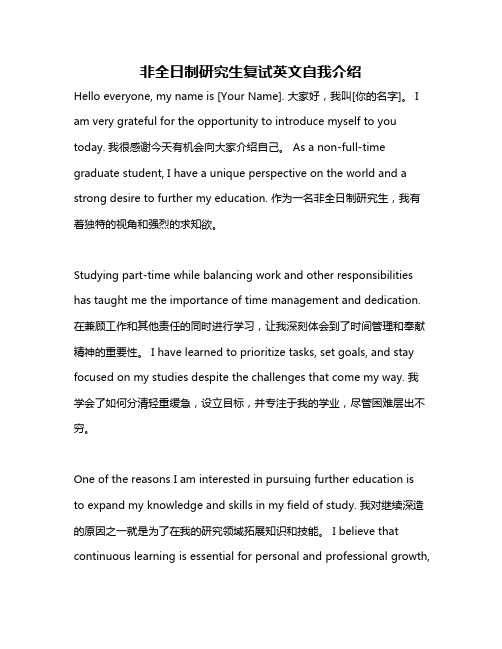
非全日制研究生复试英文自我介绍Hello everyone, my name is [Your Name]. 大家好,我叫[你的名字]。
I am very grateful for the opportunity to introduce myself to you today. 我很感谢今天有机会向大家介绍自己。
As a non-full-time graduate student, I have a unique perspective on the world and a strong desire to further my education. 作为一名非全日制研究生,我有着独特的视角和强烈的求知欲。
Studying part-time while balancing work and other responsibilities has taught me the importance of time management and dedication. 在兼顾工作和其他责任的同时进行学习,让我深刻体会到了时间管理和奉献精神的重要性。
I have learned to prioritize tasks, set goals, and stay focused on my studies despite the challenges that come my way. 我学会了如何分清轻重缓急,设立目标,并专注于我的学业,尽管困难层出不穷。
One of the reasons I am interested in pursuing further education isto expand my knowledge and skills in my field of study. 我对继续深造的原因之一就是为了在我的研究领域拓展知识和技能。
I believe that continuous learning is essential for personal and professional growth,and I am eager to challenge myself in new ways. 我相信持续学习对个人和专业的成长至关重要,我迫切想要在新的领域接受挑战。
非全日制研究生的统考科目
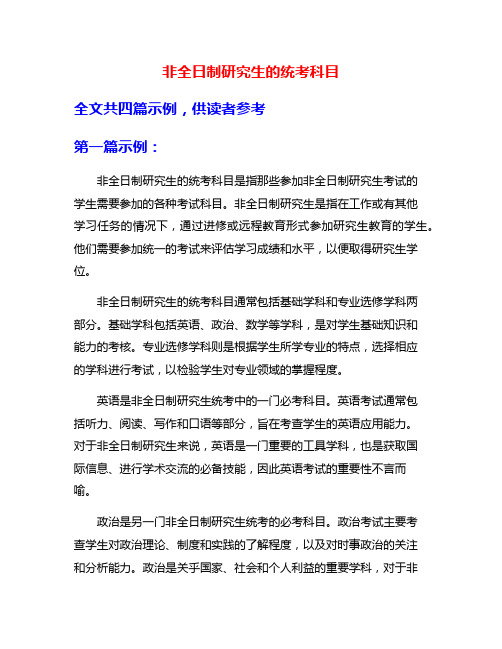
非全日制研究生的统考科目全文共四篇示例,供读者参考第一篇示例:非全日制研究生的统考科目是指那些参加非全日制研究生考试的学生需要参加的各种考试科目。
非全日制研究生是指在工作或有其他学习任务的情况下,通过进修或远程教育形式参加研究生教育的学生。
他们需要参加统一的考试来评估学习成绩和水平,以便取得研究生学位。
非全日制研究生的统考科目通常包括基础学科和专业选修学科两部分。
基础学科包括英语、政治、数学等学科,是对学生基础知识和能力的考核。
专业选修学科则是根据学生所学专业的特点,选择相应的学科进行考试,以检验学生对专业领域的掌握程度。
英语是非全日制研究生统考中的一门必考科目。
英语考试通常包括听力、阅读、写作和口语等部分,旨在考查学生的英语应用能力。
对于非全日制研究生来说,英语是一门重要的工具学科,也是获取国际信息、进行学术交流的必备技能,因此英语考试的重要性不言而喻。
政治是另一门非全日制研究生统考的必考科目。
政治考试主要考查学生对政治理论、制度和实践的了解程度,以及对时事政治的关注和分析能力。
政治是关乎国家、社会和个人利益的重要学科,对于非全日制研究生来说,了解和掌握政治知识是提高社会责任感和参与政治生活的必备条件。
数学也是非全日制研究生统考中的一门重要科目。
数学是一门基础学科,具有普适性和广泛性,对于各种学科都有重要的支撑作用。
非全日制研究生需要参加数学考试,主要考查他们的数学基本技能和逻辑思维能力,以及在实际问题解决中的应用能力。
非全日制研究生的统考科目设计旨在全面评价学生在不同学科领域的学习成果和综合能力。
通过这些考试,学校和社会可以了解学生的学术水平和综合素质,为其提供进一步学习和发展的机会。
非全日制研究生通过努力学习,不断提升自己,完成统考科目的考试,取得研究生学位,成为社会发展和进步的栋梁之才。
【结束】第二篇示例:非全日制研究生统考科目是指在工作之余选择考取研究生学位的考生所需参加的统一考试。
相比全日制研究生考试,非全日制研究生统考科目通常更加灵活,适应了在职人士的学习需求和时间安排。
接受非全日制定向培养硕士研究生协议书【含注意事项】

接受非全日制定向培养硕士研究生协议书【含注意事项】偿学费,同时承担因不执行协议而产生的后果和责任。
九、本协议未尽事宜由甲、乙、丙三方协商解决。
甲方:(盖章)___________乙方:(盖章)___________丙方:(签字)___________小幅度改写:合同编号:非全日制定向培养硕士研究生协议书标准范本)甲方:____________________________乙方:____________________________丙方:____________________________签订地点:____________________________签订日期:__________年______月______日非全日制定向培养硕士研究生协议书学号(由XXX填写):甲方)同意(乙方:考生所在单位)委托招收同志(丙方:考生)为2019级攻读专业)非全日制定向培养硕士学位研究生。
经甲、乙、丙三方协商同意:一、非全日制定向培养硕士研究生来源由甲方向全国统一招考或由乙方推荐符合报考条件者参加甲方的入学资格考试成绩合格者。
二、非全日制定向培养硕士研究生的招生工作由甲方负责进行,并按甲方录取标准,经甲、乙双方协商并征得丙方同意后才能录取,并落实指导老师和培养方案。
三、非全日制定向培养硕士研究生必须遵守甲方各项规章制度,服从所在学院(系、所)的领导和管理,服从导师的安排和指导。
四、非全日制定向培养硕士研究生须按照规定交纳学费;不转户口、不调档案、不转组织关系、不安排住宿、不享受国家和学校奖助政策。
五、乙方推荐的为本单位定向培养的本单位在职人员考生被录取为研究生后,其研究期间不转工资关系,享受原工资和其它福利待遇(具体由乙、丙双方协商确定)。
丙方所交纳学费等是否由乙方报销,由乙、丙双方协商确定。
六、丙方自入学之日起即属乙方人员,其毕业或肄业后由乙方分配工作,凡中途休学或违反国家法律法规和学校纪律的,由甲方提出意见送交乙方负责处理。
非全日制研究生条件报名要求
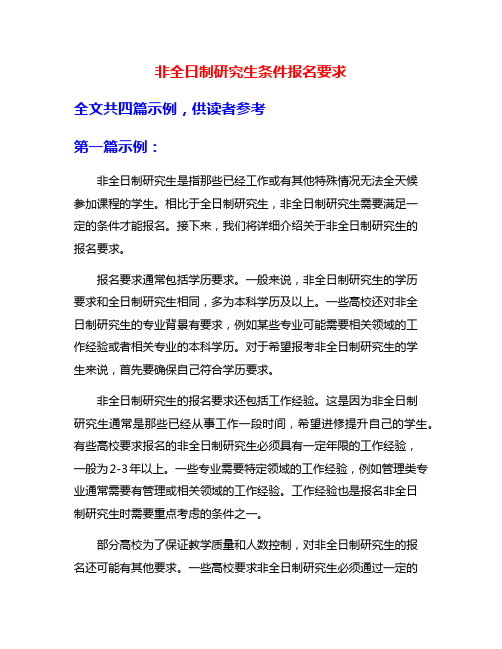
非全日制研究生条件报名要求全文共四篇示例,供读者参考第一篇示例:非全日制研究生是指那些已经工作或有其他特殊情况无法全天候参加课程的学生。
相比于全日制研究生,非全日制研究生需要满足一定的条件才能报名。
接下来,我们将详细介绍关于非全日制研究生的报名要求。
报名要求通常包括学历要求。
一般来说,非全日制研究生的学历要求和全日制研究生相同,多为本科学历及以上。
一些高校还对非全日制研究生的专业背景有要求,例如某些专业可能需要相关领域的工作经验或者相关专业的本科学历。
对于希望报考非全日制研究生的学生来说,首先要确保自己符合学历要求。
非全日制研究生的报名要求还包括工作经验。
这是因为非全日制研究生通常是那些已经从事工作一段时间,希望进修提升自己的学生。
有些高校要求报名的非全日制研究生必须具有一定年限的工作经验,一般为2-3年以上。
一些专业需要特定领域的工作经验,例如管理类专业通常需要有管理或相关领域的工作经验。
工作经验也是报名非全日制研究生时需要重点考虑的条件之一。
部分高校为了保证教学质量和人数控制,对非全日制研究生的报名还可能有其他要求。
一些高校要求非全日制研究生必须通过一定的入学考试或者面试,以评估其学习能力和学术水平。
有些高校还可能要求非全日制研究生提供推荐信或者个人陈述,以确保学生具备学习的动力和热情。
一些高校还会要求非全日制研究生提供相关的职业资格证书或者培训经历,以确保学生具备所报考专业的基本素质。
报名非全日制研究生需要符合一定的学历、工作经验和其他条件。
这些条件旨在确保学生具备充足的学术基础和实践经验,以便在进修过程中能够更好地理解和应用所学知识。
对于希望报考非全日制研究生的学生来说,除了关注专业要求外,也要认真准备各种材料,以确保自己的申请能够获得成功。
希望本文能够帮助大家更好地了解非全日制研究生的报名要求,祝愿大家能够顺利被录取并实现自己的学术梦想。
第二篇示例:非全日制研究生是指那些在工作或有其他事务的学生。
非全日制研究生自我介绍英文
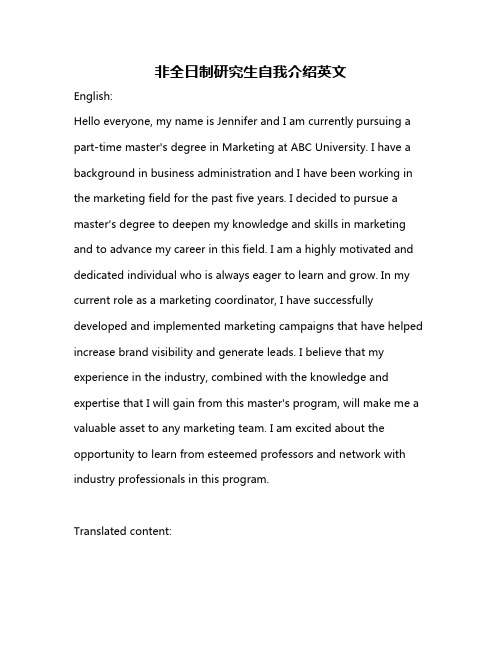
非全日制研究生自我介绍英文English:Hello everyone, my name is Jennifer and I am currently pursuing a part-time master's degree in Marketing at ABC University. I have a background in business administration and I have been working in the marketing field for the past five years. I decided to pursue a master's degree to deepen my knowledge and skills in marketing and to advance my career in this field. I am a highly motivated and dedicated individual who is always eager to learn and grow. In my current role as a marketing coordinator, I have successfully developed and implemented marketing campaigns that have helped increase brand visibility and generate leads. I believe that my experience in the industry, combined with the knowledge and expertise that I will gain from this master's program, will make me a valuable asset to any marketing team. I am excited about the opportunity to learn from esteemed professors and network with industry professionals in this program.Translated content:大家好,我叫Jennifer,目前在ABC大学攻读营销领域的非全日制硕士学位。
非全日制考研英语作文

非全日制考研英语作文Title: The Benefits of Part-time Postgraduate Study。
In recent years, part-time postgraduate study has become increasingly popular among working professionals and individuals with other commitments. This trend is driven by the benefits that part-time study offers, including flexibility, career advancement, and personal development.One of the main advantages of part-time postgraduate study is the flexibility it provides. Many individuals who choose to pursue a postgraduate degree on a part-time basis do so because they have other commitments, such as a full-time job or family responsibilities. By studying part-time, they are able to balance their academic pursuits with their other obligations. This flexibility allows them to continue working and earning a living while also furthering their education.Additionally, part-time postgraduate study can lead tocareer advancement. Many employers value advanced degrees and are more likely to promote or provide opportunities for career growth to employees who have pursued further education. By obtaining a postgraduate degree, individuals can enhance their skills and knowledge, making them more competitive in the job market and within their current organization. This can open up new career opportunities and increase earning potential.Furthermore, part-time postgraduate study offers personal development benefits. Pursuing a postgraduate degree requires a high level of dedication, time management, and self-discipline. These skills are valuable in both professional and personal settings, and individuals who undertake part-time study often find that they become more organized and efficient in their daily lives. Additionally, the knowledge and expertise gained through postgraduate study can lead to personal growth and a greater sense of accomplishment.In conclusion, part-time postgraduate study offers numerous benefits, including flexibility, careeradvancement, and personal development. As the demand for advanced education continues to grow, part-time study provides a viable option for individuals who wish tofurther their education while maintaining a balance with their other commitments. Whether for professional advancement or personal fulfillment, part-time postgraduate study is a valuable and rewarding endeavor.。
- 1、下载文档前请自行甄别文档内容的完整性,平台不提供额外的编辑、内容补充、找答案等附加服务。
- 2、"仅部分预览"的文档,不可在线预览部分如存在完整性等问题,可反馈申请退款(可完整预览的文档不适用该条件!)。
- 3、如文档侵犯您的权益,请联系客服反馈,我们会尽快为您处理(人工客服工作时间:9:00-18:30)。
2018年非全日制研究生全国统一初试考试英语一真题及参考答案(完整版),具体内如如下:Section I Use of EnglishDirections:Read the following text. Choose the best word (s) for each numbered blank and mark A, B, C or D on the ANSWER SHEET. (10 points)Trust is a tricky business. On the one hand, it's a necessary condition 1 many worthwhile things: child care, friendships, etc. On the other hand, putting your 2 , in the wrong place often carries a high 3.4, why do we trust at all? Well, because it feels good. 5 people place their trust in an individual or an institution, their brains release oxytocin, a hormone that 6 pleasurable feelings and triggers the herding instruct that prompts humans to 7 with one another. Scientists have found that exposure 8 this hormone puts us in a trusting 9: In a Swiss study, researchers sprayed oxytocin into the noses of half the subjects; those subjects were ready to lend significantly higher amounts of money to strangers than were their 10 who inhaled something else.11 for us, we also have a sixth sense for dishonesty that may 12 us. A Canadian study found that children as young as 14 months can differentiate 13 a credible person and a dishonest one. Sixty toddlers were each 14 to an adult tester holding a p lastic container. The tester would ask, “What’s in here?” before looking into the container, smiling, and exclaiming, “Wow!” Each subject was then invited to look 15. Half of them found a toy; the other half 16 the container was empty-and realized the tester had 17 them.Among the children who had not been tricked, the majority were 18 to cooperate with the tester in learning a new skill, demonstrating that they trusted his leadership. 19, only five of the 30 children paired with the “20”tester participated in a follow-up activity.Section II Reading ComprehensionPart ADirections:Read the following four texts. Answer the questions below each text by choosing A, B, C or D. Mark your answers on the ANSWER SHEET. (40 points)Text 1Among the annoying challenges facing the middle class is one that will probably go unmentioned in the next presidential campaign: What happens when the robots come for their jobs?Don't dismiss that possibility entirely. About half of U.S. jobs are at high risk of being automated, according to a University of Oxford study, with the middle class disproportionately squeezed. Lower-income jobs like gardening or day care don't appeal to robots. But many middle-class occupations-trucking, financial advice, software engineering — have aroused their interest, or soon will. The rich own the robots, so they will be fine.This isn't to be alarmist. Optimists point out that technological upheaval has benefited workers in the past. The Industrial Revolution didn't go so well for Luddites whose jobs were displaced by mechanized looms, but it eventually raised living standards and created more jobs than it destroyed. Likewise, automation should eventually boost productivity, stimulate demand by driving down prices, and free workers from hard, boring work. But in the medium term, middle-class workers may need a lot of help adjusting.The first step, as Erik Brynjolfsson and Andrew McAfee argue in The Second Machine Age, should be rethinking education and job training. Curriculums —from grammar school to college- should evolve to focus less on memorizing facts and more on creativity and complex communication. Vocational schools should do a better job of fostering problem-solving skills and helping students work alongside robots. Online education can supplement the traditional kind. It could make extra training and instruction affordable. Professionals trying to acquire new skills will be able to do so without going into debt.The challenge of coping with automation underlines the need for the U.S. to revive its fading business dynamism: Starting new companies must be made easier. In previous eras of drastic technological change, entrepreneurs smoothed the transition by dreaming up ways to combine labor and machines. The best uses of 3D printers and virtual reality haven't been invented yet. The U.S. needs the new companies that will invent them.Finally, because automation threatens to widen the gap between capital income and labor income, taxes and the safety net will have to be rethought. Taxes on low-wage labor need to be cut, and wage subsidies such as the earned income tax credit should be expanded: This would boost incomes, encourage work, reward companies for job creation, and reduce inequality.Technology will improve society in ways big and small over the next few years, yet this will be little comfort to those who find their lives and careers upended by automation.Destroying the machines that are coming for our jobs would be nuts. But policies to help workers adapt will be indispensable.Text 2A new survey by Harvard University finds more than two-thirds of young Americans disapprove of President Trump’s use of Twitter. The implication is that Millennials prefer news from the White House to be filtered through other source, Not a president’s social media platform.Most Americans rely on social media to check daily headlines. Yet as distrust has risen toward all media, people may be starting to beef up their media literacy skills. Such a trend is badly needed. During the 2016 presidential campaign, nearly a quarter of web content shared by Twitter users in the politically critical state of Michigan was fake news, according to the University of Oxford. And a survey conducted for BuzzFeed News found 44 percent of Facebook users rarely or never trust news from the media giant.Young people who are digital natives are indeed becoming more skillful at separating fact from fiction in cyberspace. A Knight Foundation focus-group survey of young people between ages 14an d24 found they use “distributed trust” to verify stories. They cross-check sources and prefer news from different perspectives—especially those that are open about any bias. “Many young people assume a great deal of personal responsibility for educating themselves and actively seeking out opposing viewpoints,” the survey concluded.Such active research can have another effect. A 2014 survey conducted in Australia, Britain, and the United States by the University of Wisconsin-Madison found that young peopl e’s reliance on social media led to greater political engagement.Social media allows users to experience news events more intimately and immediately while also permitting them to re-share news as a projection of their values and interests. This forces users to be more conscious of their role in passing along information. A survey by Barna research group found the top reason given by Americans for the fake news phenomenon is “reader error,” more so than made-up stories or factual mistakes in reporting. About a third say the problem of fake news lies in “misinterpretation or exaggeration of actual news” via social media. In other words, the choice to share news on social media may be the heart of the issue. “This indicates there is a real personal responsib ility in counteracting this problem,” says Roxanne Stone, editor in chief at Barna Group.So when young people are critical of an over-tweeting president, they reveal a mental discipline in thinking skills – and in their choices on when to share on social media.Text 3Any fair-minded assessment of the dangers of the deal between Britain's National Health Service (NHS) and DeepMind must start by acknowledging that both sides mean well. DeepMind is one of the leading artificial intelligence (AI) companies in the world. The potential of this work applied to healthcare is very great, but it could also lead to further concentration of power in the tech giants. It Is against that background that the information commissioner, Elizabeth Denham, has issued her damning verdict against the Royal Free hospital trust under the NHS, which handed over to DeepMind the records of 1.6 million patients In 2015 on the basis of a vague agreement which took far too little account of the patients' rights and their expectations of privacy.DeepMind has almost apologized. The NHS trust has mended its ways. Further arrangements- and there may be many-between the NHS and DeepMindwill be carefully scrutinised to ensure that all necessary permissions have been asked of patients and all unnecessary data has been cleaned. There are lessons about informed patient consent to learn. But privacy is not the only angle in this case and not even the most important. Ms Denham chose to concentrate the blame on the NHS trust, since under e xisting law it “controlled” the data and DeepMind merely “processed" it. But this distinction misses the point that it is processing and aggregation, not the mere possession of bits, that gives the data value.The great question is who should benefit from the analysis of all the data that our lives now generate. Privacy law builds on the concept of damage to an individual from identifiable knowledge about them. That misses the way the surveillance economy works. The data of an individual there gains its value only when it is compared with the data of countless millions more.The use of privacy law to curb the tech giants in this instance feels slightly maladapted. This practice does not address the real worry. It is not enough to say that the algorithms DeepMind develops will benefit patients and save lives. What matters is that they will belong to a private monopoly which developed them using public resources. If software promises to save lives on the scale that dugs now can, big data may be expected to behave as a big pharm has done. We are still at the beginning of this revolution and small choices now may turn out to have gigantic consequences later. A long struggle will be needed to avoid a future of digital feudalism. Ms Denham's report is a welcome start.Text 4The U.S. Postal Service (USPS) continues to bleed red ink. It reported a net loss of $5.6 billion for fiscal 2016, the 10th straight year its expenses have exceeded revenue. Meanwhile, it has more than $120 billion in unfunded liabilities, mostly for employee health and retirement costs. There are many bankruptcies. Fundamentally, the USPS is in a historic squeeze between technological change that has permanently decreased demand for its bread-and-butter product, first-class mail, and a regulatory structure that denies management the flexibility to adjust its operations to the new reality And interest groups ranging from postal unions to greeting-card makers exert self-interested pressure on the USPS’s ultimate overseer-Congress-insisting that whatever else happens to the Postal Service, aspects of the status quo they depend on get protected. This is why repeated attempts at reform legislation havefailed in recent years, leaving the Postal Service unable to pay its bills except by deferring vital modernization.Now comes word that everyone involved---Democrats, Republicans, the Postal Service, the unions and the system's heaviest users—has finally agreed on a plan to fix the system. Legislation is moving through the House that would save USPS an estimated $28.6 billion over five years, which could help pay for new vehicles, among other survival measures. Most of the money would come from a penny-per-letter permanent rate increase and from shifting postal retirees into Medicare. The latter step would largely offset the financial burden of annually pre-funding retiree health care, thus addressing a long-standing complaint by the USPS and its union.If it clears the House, this measure would still have to get through the Senate – where someone is bound to point out that it amounts to the bare, bare minimum necessary to keep the Postal Service afloat, not comprehensive reform. There’s no change to collective bargaining at the USPS, a major omission considering that personnel accounts for 80 percent of the agency’s costs. Also missing is any discussion of eliminating Saturday letter delivery. That common-sense change enjoys wide public support and would save the USPS $2 billion per year. But postal special-interest groups seem to have killed it, at least in the House. The emerging consensus around the bill is a sign that legislators are getting frightened about a politically embarrassing short-term collapse at the USPS. It is not, however, a sign that they’re getting serious about transforming the postal system for the 21st century.Part BDirections:The following paragraphs are given in a wrong order. For Questions 41-45, you are required to reorganize these paragraphs into a coherent article by choosing from the list A-G and filling them into the numbered boxes. ParagraphsC and F have been correctly placed. Mark your answers on ANSWER SHEET.(10 points)A. In December of 1869, Congress appointed a commission to select a site and prepare plans and cost estimates for a new State Department Building. The commission was also to consider possible arrangements for the War and Navy Departments. To the horror of some who expected a Greek Revival twin of the Treasury Building to be erected on the other side of the White House, theelaborate French Second Empire style design by Alfred Mullett was selected, and construction of a building to house all three departments began in June of 1871.B. Completed in 1875, the State Department's south wing was the first to be occupied, with its elegant four-story library (completed in 1876), Diplomatic Reception Room, and Secretary's office decorated with carved wood, Oriental rugs, and stenciled wall patterns. The Navy Department moved into the east wing in 1879, where elaborate wall and ceiling stenciling and marquetry floors decorated the office of the Secretary.C. The State, War, and Navy Building, as it was originally known, housed the three Executive Branch Departments most intimately associated with formulating and conducting the nation's foreign policy in the last quarter of the nineteenth century and the first quarter of the twentieth century-the period when the United States emerged as an international power. The building has housed some of the nation's most significant diplomats and politicians and has been the scene of many historic events.D. Many of the most celebrated national figures have participated in historical events that have taken place within the EEOB's granite walls. Theodore and Franklin D. Roosevelt, William Howard Taft, Dwight D. Eisenhower, Lyndon B. Johnson, Gerald Ford, and George H. W. Bush all had offices in this building before becoming president. It has housed 16 Secretaries of the Navy, 21 Secretaries of War, and 24 Secretaries of State. Winston Churchill once walked its corridors and Japanese emissaries met here with Secretary of State Cordell Hull after the bombing of Pearl Harbor.E. The Eisenhower Executive Office Building (EEOB) commands a unique position in both the national history and the architectural heritage of the United States. Designed by Supervising Architect of the Treasury, Alfred B. Mullett, it was built from 1871 to 1888 to house the growing staffs of the State, War, and Navy Departments, and is considered one of the best examples of French Second Empire architecture in the country.F. Construction took 17 years as the building slowly rose wing by wing. When the EEOB was finished, it was the largest office building in Washington, with nearly 2 miles of black and white tiled corridors. Almost all of the interior detail is of cast iron or plaster; the use of wood was minimized to insure fire safety. Eight monumental curving staircases of granite with over 4,000 individually cast bronze balusters are capped by four skylight domes and two stained glass rotundas.G. The history of the EEOB began long before its foundations were laid. The first executive offices were constructed between 1799 and 1820. A series of fires (including those set by the British in 1814) and overcrowded conditions ledto the construction of the existing Treasury Building. In 1866, the construction of the North Wing of the Treasury Building necessitated the demolition of the State Department building.【答案】41. (E)→C →42. (G) →43. (A)→F→44. (B)→45. (D)Part CDirections:Read the following text carefully and then translate the underlined segments into Chinese. Your translation should be written neatly on the ANSWER SHEET.(10 points)Shakespeare’s life time was coincident with a period of extraordinary activity and achievement in the drama.(46) By the date of his birth Europe was witnessing the passing of the religious drama, and the creation of new forms under the incentive of classical tragedy and comedy. These new forms were at first mainly written by scholars and performed by amateurs, but in England, as everywhere else in western Europe, the growth of a class of professional actors was threatening to make the drama popular, whether it should be new or old, classical or medieval, literary or farcical. Court, school organizations of amateurs, and the traveling actors were all rivals in supplying a widespread desire for dramatic entertainment; and (47) no boy who went a grammar school could be ignorant that the drama was a form of literature which gave glory to Greece and Rome and might yet bring honor to England.When Shakespeare was twelve years old, the first public playhouse was built in London. For a time literature showed no interest in this public stage. Plays aiming at literary distinction were written for school or court, or for the choir boys of St. Paul’s and the royal chapel, who, however, gave plays in public as well as at court.(48) but the professional companies prospered in their permanent theaters, and university men with literature ambitions were quick to turn to these theaters as offering a means of livelihood. By the time Shakespeare was twenty-five, Lyly, Peele, and Greene had made comedies that were at once popular and literary; Kyd had written a tragedy that crowded the pit; and Marlowe had brought poetry and genius to triumph on the common stage - where they had played no part since the death of Euripides. (49) A native literary drama had been created, its alliance with the public playhouses established, and at least some of its great traditions had been begun.The development of the Elizabethan drama for the next twenty-five years is of exceptional interest to students of literary history, for in this brief period we may trace the beginning, growth, blossoming, and decay of many kinds of plays, and of many great careers. We are amazed today at the mere number of plays produced, as well as by the number of dramatists writing at the same time for this London of two hundred thousand inhabitants. (50)To realize how great was thedramatic activity, we must remember further that hosts of plays have been lost, and that probably there is no author of note whose entire work has survived.【参考译文】46.到莎士比亚出生的年代,欧洲经历了宗教戏剧的消亡,以及在古典悲剧和喜剧的影响下新的戏剧形式的产生。
